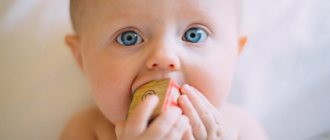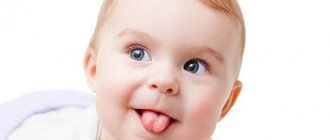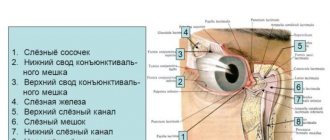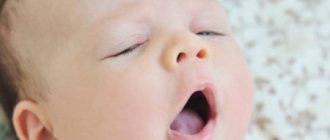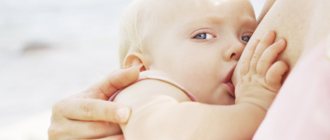Why does my 2 month old baby drool in bubbles? How to survive this period?
Excessive saliva production is a completely natural phenomenon in babies.
It is not a symptom of disease or developmental abnormalities, but accompanies the processes of maturation of the salivary glands or teething. When a baby is born, he practically does not need saliva: the food he eats in infancy has a liquid consistency and does not require grinding.
As development progresses, around the end of the first month of life, saliva production increases. In this way, the salivary glands mature, form and prepare to work at full capacity to ensure normal digestion of food. It is at this time that saliva begins to flow more than usual. This is due not so much to its large quantity as to the inability to swallow it, since the child cannot yet control the movements of the tongue, cheeks and throat to the required extent. Therefore, saliva pours out of the mouth, and the baby begins to play with it, making bubbles.
Later, when the baby is more or less able to swallow saliva, a new stage of development begins: teething. The gums loosen, all this is accompanied by pain, and hyperproduction of saliva begins again. The same thing happens during the start of complementary feeding. Saliva helps with swallowing food and getting used to new foods that have a consistency that is still unfamiliar to the child.
1. The beginning of the functioning of the salivary glands.
This reason is the most common. In the third month, the salivary glands begin to actively work and a large volume of saliva begins to be produced. And the swallowing reflex is fully formed only by 5 months, so a baby simply cannot swallow so much saliva. It is for this reason that drool flows out.
2. We are waiting for the first tooth.
Even though the first teeth appear after four to six months, the gums can already begin to prepare for this event. The teeth gradually begin to move in the gum, preparing to come out in a few months. The body begins to produce an increased amount of saliva to moisten the irritated gums. As soon as the first tooth cuts a hole in the gum, the amount of saliva will decrease.
3. Saliva protects the small organism.
It turns out that the baby’s saliva contains special antibacterial substances. They help neutralize infections that enter the mouth. This is an extremely useful and necessary property of saliva. Starting from 2 months, a small child begins to put everything in his mouth.
It could be a rattle, your own hands or your mother's finger. It is the abundant saliva that prevents infections and bacteria from entering the baby’s body. Salivary fluid washes the mouth and flows out along with possible bacteria.
4. Allergic reaction.
Approximately 15% of children are predisposed to a disease such as allergic rhinitis. Signs of this disease, in addition to excessive drooling, are also swelling of the mucous membrane, teary eyes, sneezing, and itching in the nose. The cause of such rhinitis can be dust, flowering plants, or pet hair.
Doctors' advice on what to do if a child has low hemoglobin at 3 months.
Read here about how a baby develops at 7 months. Norms of weight and height.
In this article, read about the daily routine of a baby at 9 months, about his nutrition, development, and feeding.
If you observe all these symptoms in your baby, then you need to consult a doctor and get advice and appropriate treatment.
5. Oral diseases.
Sometimes excessive drooling may indicate oral diseases such as thrush or stomatitis.
In addition to increased salivation, in these diseases the child will be restless, capricious, will suck poorly, and white plaque or plaques may be found on the mucous membranes.
If you have such symptoms, you should urgently contact your pediatrician and consult about treatment.
6. Hypersalivation.
Very rarely, but copious amounts of salivary fluid may be one of the signs of a serious illness.
In order not to miss the disease, you should carefully monitor the baby’s health and undergo all necessary tests and studies according to age.
A consultation with a neurologist and pediatrician will clarify the picture and relieve parents from unnecessary suspicion.
Most parents consider excessive salivation in babies in the first year of life to be the first signs of teething, and therefore they are very worried if a child at 2 months begins to drool and bubble. Some consider this a sign of endocrine diseases, others – neurological symptoms, but both of them spend a lot of effort, time and their nerve cells figuring out whether this is normal and what to do about it.
The salivary glands begin their work during the intrauterine development of the fetus, but only by 2-3 months of life do they become truly active and produce a sufficient amount of saliva. Therefore, parents whose children drool and bubble a lot at the age of 2-3 months should only rejoice at the new stage in the child’s development and try to make it as comfortable as possible for the baby and others.
Due to the fact that previously there was little saliva and the child simply did not have such a need, he will learn to swallow excess liquid only by 4-5 months, and then the first teeth will arrive and the epic with drooling will begin again, so that it will completely stop by 1 month. 6-2, or even 3 years.
If increased drooling is explained by the next stage in the child’s development, then he should not have any other signs of pathology. The baby should remain cheerful, calm, eat with appetite, play, walk and feel great, with the possible exception of redness and maceration of the skin on the chin, which appears in children due to constant irritation with saliva.
How to stop an older child from thumb sucking?
Babies who have enough opportunity to satisfy their sucking reflex usually stop putting their fingers in their mouth after the first birthday. If the baby has an ingrained habit, getting rid of it may take a long time until he enters kindergarten or school.
- Grown-up children suck their thumb to regain that calm and joyful feeling that they experienced at their mother’s breast . At the same time, the baby may show other signs of returning to early childhood. For example, a child may refuse to eat or dress on his own and instead use the potty to wet his pants. The reason for this behavior may be an overly strict attitude on the part of the parents.
Try to pay more attention to your child, praise him for any achievements and victories, play and walk together. Psychological comfort will allow the baby to feel more confident, and he will no longer want to savor his fingers.
- Very often, a child’s finger “jumps” into his mouth in a stressful or scary situation . If your baby is afraid of dogs, every time he meets an unfamiliar animal on the street, he may have an irresistible desire to feel safe, and the best way to console him is a finger. If your baby can't fall asleep without putting his thumb in his mouth, he may be afraid to be alone or in the dark in the nursery.
Try turning on a night light and putting your child's favorite toy in bed.
- Often the finger reaches for the mouth when the child is not aware of his actions.
Exercise maximum vigilance. At the first impulse to suck a child’s finger, you need to distract him with something, occupy his hands with toys, construction sets or drawing pencils. It is advisable that both hands participate in the fun.
With children 4-5 years old you can try to negotiate:
- Find out the reason for this behavior.
- Remind your child that he is already an adult, so he doesn’t need a finger in his mouth.
- Offer a pleasant reward for voluntarily giving up a bad habit.
What should saliva be like normally?
In a healthy person, saliva appears clear or slightly cloudy and colorless, practically odorless. It is a little viscous; if you rub a drop between your fingers, you will feel it slipping. The viscosity is only slightly greater than that of water. The density of saliva varies depending on its composition and ranges from 1.002–1.12 g/ml.
One of the most important characteristics of saliva is acidity. Normally, it should be above 7 pH, that is, saliva is an alkaline environment. As acidity increases, salivary fluid loses its bactericidal properties. An acidic environment is perfect for the proliferation of pathogens.
The buffering capacity of saliva is a concept that characterizes the ability of salivary fluid to neutralize harmful substances that enter the oral cavity. The higher the acidity, the lower the buffer capacity. Acidity increases with prolonged consumption of carbohydrates. That is why parents forbid their children to eat a lot of sweets so that they do not have caries.
Parents should not be surprised if their beloved baby drools a lot. This is a normal physiological process intended by nature itself. Parents should be alerted to the side symptoms that accompany their increased secretion in toddlers. Therefore, you should know when such a physiological process should cause an alarming reaction, and when this is the norm and does not require any medical intervention.
Newborn
An increase in salivation can be observed in the first months after birth. In newborn children, this process is nothing more than a protective function.
In addition, saliva performs another important function in newborns, especially from 2 to 5 months. Thanks to special enzymes that are part of saliva, starch is broken down into sugar. This allows the gastrointestinal tract to adapt favorably to a new environment, promotes the proper digestion process, and normalizes intestinal function.
At 1 month
The swallowing reflex in a newborn is not yet fully developed, but the active work of the salivary glands stimulates the production of saliva. At 1 month old, the baby has not yet learned to swallow, although the young mother notices his swallowing reflex when breastfeeding.
Not understanding what he should do with the saliva in his mouth if he is already full, the logical action for him would be to release the saliva outward - and it seems to his parents that it is flowing in a stream down his chin. Mom and dad must ensure that the baby does not choke on saliva while lying on his back - it is best to place him on his side. Also make sure that the baby's chin remains dry, if possible.
At 2 months
Why is my baby salivating?
Newborn babies begin to drool immediately after birth, and salivation only increases until they are three months old. It’s not for nothing that bibs are hung on babies’ chests so that they don’t get their clothes wet. Sometimes this feature of babies seems cute, but every mother has at least once asked the following question: is it normal for drooling so much, or is it due to illness?
Saliva is produced immediately when a baby is born, but at 2–3 months the baby bubbles the most profusely. This is a normal process, it is necessary for the full development of the child. Reasons why newborns experience increased salivation:
- Unformed swallowing reflex. Despite the fact that the baby has already been born, many body functions are just beginning to develop. Swallowing is difficult in two-month-old babies, which is why excess saliva forms in the mouth, because it helps food slip inside into the esophagus. At two or three months, the baby also has not yet learned to swallow drool; there is too much of it, and the process happens constantly, so he blows bubbles and streams of salivary fluid flow down his chin.
- Protective barrier. After birth, the baby finds himself in a new, unknown world. He wants to know everything, try everything, and one of the ways to learn is to put an object in his mouth. The child puts toys, a blanket, and his own fingers and toes into his mouth. The immune system is not yet fully formed, so it will not be able to fight back all microorganisms that enter the body through the mouth. To protect your baby, you need as much saliva as possible, which can neutralize bacteria from a dirty toy.
- Teething. The first teeth begin to appear at 3–4 months. This process is accompanied by pain, itching in the gums, the baby’s temperature rises, he becomes lethargic and moody. Saliva has a disinfecting and calming effect. Profuse salivation helps the baby cope with such a painful process.
The peak of intense salivary fluid secretion occurs at 3–5 months. By six months, the swallowing reflex is almost formed. At what age does drooling stop flowing? By the age of 1 year, saliva production is normalized, the baby can already control swallowing, and liquid does not flow down the chin.
Causes of pathological salivation in a 2-3 month old baby:
- Stomatitis is an inflammatory disease of the oral cavity, characterized by the formation of ulcers and aphthae on the mucous membrane. With the help of saliva, the body tries to neutralize the infection; it is released as a reaction to infection. Also, the amount of salivary fluid increases due to the pain experienced by the baby
- Candidiasis is a fungal infection caused by fungi of the genus Candida. A common occurrence in newborns who become infected with thrush from the mother during the birth canal or from dirty nipples and bottles. It manifests itself in the appearance of a white cheesy coating on the tongue, under which bleeding ulcers are hidden. Saliva from thrush is thick, cloudy, and smells unpleasant.
- Cerebral palsy and other disorders of the central nervous system. The child experiences partial muscle paralysis, convulsions, and impaired coordination of muscle movements. Such disorders prevent children from retaining saliva in their mouths.
- Colds, ARVI, respiratory diseases (bronchitis, pneumonia, sore throat). With these ailments, in addition to hypersalivation, the child develops a cough, runny nose, and fever.
- Diseases of the digestive system. Pathologies in the functioning of the stomach and intestines can provoke increased salivation. The saliva will smell unpleasant and have a thicker consistency.
Changes in the amount and composition of saliva can occur due to stressful situations and nervous tension. Only a doctor can find out the reason that caused hypersalivation. First of all, it is necessary to take the baby to a pediatrician, and he will refer you to other specialists, if necessary: an endocrinologist, neurologist, dentist or gastroenterologist.
All newborns in the first month are distinguished by the fact that their salivary glands have a fairly low level of secretory activity. It is generally not common for a one-month-old baby to drool a lot with bubbles, but there are several factors that can cause excessive drooling:
- Immaturity of the system that regulates salivation. However, by one and a half months, drool released in large quantities will become normal, since it is by this age that the salivary glands begin to work more actively.
- Allergic rhinitis or infection that is bacterial or viral in nature. Similar causes are quite likely if there are no other symptoms (for example, the baby is getting its first teeth, and therefore he sucks his fists all the time).
- Birth defects. In this case, you should consult your pediatrician.
https://www.youtube.com/watch?v=VXHUtUf4z6A
When a 2-month-old baby drools, this is most often due to the inability to swallow it - this physiological process occurs naturally only during feeding. During this period of time, the endocrine glands and salivary glands simultaneously begin to function in the baby’s body.
A baby who drools too much may develop a chin rash due to constant humidity and the influence of digestive enzymes contained in saliva. You should protect your delicate skin by lubricating it with olive oil or cream, especially when you go for a walk. Keep soft wipes handy and wipe your child's face. Put your baby on a bib and change it often.
If the skin is still inflamed, you need to show the child to a doctor. Perhaps an infection has occurred, and this requires prompt treatment.
There is an opinion that if a baby's mouth is drooling, it means that the first tooth will soon appear. This opinion is not always shared by pediatricians, because pediatrics clearly states that the baby’s first tooth erupts at about 6 months from birth. Let's look at this issue in more depth. An interesting fact is that the salivary glands have the ability to produce saliva even at the stage of intrauterine development of the fetus. Let's find out why a child drools at such an early age?
Drooling in babies and their causes
After the birth of the baby and as he grows up, every day something new can be observed in his development. Symptoms that are alarming for the mother, for example, increased salivation after the second month of life, cannot be ignored. The baby drools, which at first does not cause any discomfort to the baby, then, after a few days, the saliva secretion becomes more abundant, and the mother has to change the baby’s clothes more often.
The main reason for increased saliva production in babies is the preparation of the gums for teething. This period can begin at 2 months and continue throughout the first year and a half of the baby’s life. The teeth can move in the gum itself and cause pain to the baby. And saliva softens sore gums and has an anti-inflammatory effect, as nature intended.
In this case, you are unlikely to cope with drooling, but you can help the teeth appear by buying your baby chewing toys and special teethers, for example, filled with water. You can cool them in the refrigerator and give them to your child to scratch their gums. The painful sensations will be much less intense.
2. Intensive work of the salivary glands.
The salivary glands are not yet fully formed, and during the first year of life they may check their work from time to time. There is too much saliva, the baby is not able to swallow it all, and it flows out. Fortunately, such periods are short-lived and quite rare, but nevertheless they do occur.
Already from the age of three months, the baby drags rattles into his mouth. And the older you get, the more you want to try it out. Any dirty object can cause an unpleasant disease in a child - stomatitis. The body wants to get rid of the infectious agent with all its might, and since saliva has bactericidal properties, the oral cavity is literally washed with saliva from germs. Hence the complaints from parents about increased salivation in babies.
I would like you to never come across this term in everyday life. In this case, increased salivation may be a sign of a more serious condition. Parents should monitor every change in the child’s behavior and health. It is necessary to consult with a specialist to rule out diseases of the brain, unequal system, and the presence of tumors.
Hypersalivation is one of the signs of the disease, usually the primary one, because incoordination of movements in infancy is quite difficult to determine, because the baby is still just learning everything. The neurologist and pediatrician will see the picture of what is happening more clearly, so do not make hasty conclusions, but be alert.
This may indicate hunger or a desire to drink. This process may also be due to the onset of teething. In this case, the baby feels discomfort; the gums may be sensitive, irritated, itchy, etc. If the problem is in the teeth, then the fist can be replaced with a special teether, which can be chewed without problems all day long.
There is no point in weaning children off sucking. When the need for this disappears, the instinct fades away - the baby himself will stop. If you do not allow a child to do what the body requires, this may in the future result in uncertainty, complexes and other unpleasant consequences. Realization of instincts, among other things, helps to fully enjoy childhood, gain a sense of security and trust. To prevent excessive saliva from causing discomfort, you can carry a pack of wet wipes with you and wipe your baby as needed.
Mistakes parents make when weaning a bad habit
There is nothing truly dangerous to a child's health in the habit of thumb sucking. Therefore, you should not focus on eradicating such practices by radical means. It is better to try to create a favorable atmosphere in the house and actively entertain the child, teach him to get along with peers, and explore the world together.
- Some parents, in an attempt to wean their child from thumb sucking, smear the baby's hands with mustard, garlic, and even special products with an unpleasant taste.
This practice usually does not give good results and only leads to children's tantrums. With girls, you can change this method a little and paint your daughter’s nails with baby polish. Perhaps a beautiful manicure, like her mother’s, will save the young fashionista from the desire to suck her fingers, because then others will not be able to appreciate their beauty.
- The practice of immobilizing a child’s arms is also useless.
Naturally, the baby will not be able to put his finger in his mouth while his hands are tied, but as soon as they are freed, the baby will return to his old ways, because the unusual and unpleasant stiffness of movements will cause him even more stress.
- Putting wool or cotton mittens on your hands also does not work.
In a stressful situation, the baby will agree to suck on the tissue. A more rational alternative could be a special fingertip, which is placed on a favorite finger and serves as a reminder to the baby that he has put his hand in his mouth again.
In most cases, thumb sucking goes away on its own by age five. You can get rid of it if you actively distract the child, occupy his hands and maintain a warm, friendly atmosphere in the house. But it is best to prevent the formation of a habit by providing the newborn with enough opportunities to satisfy the sucking reflex.
